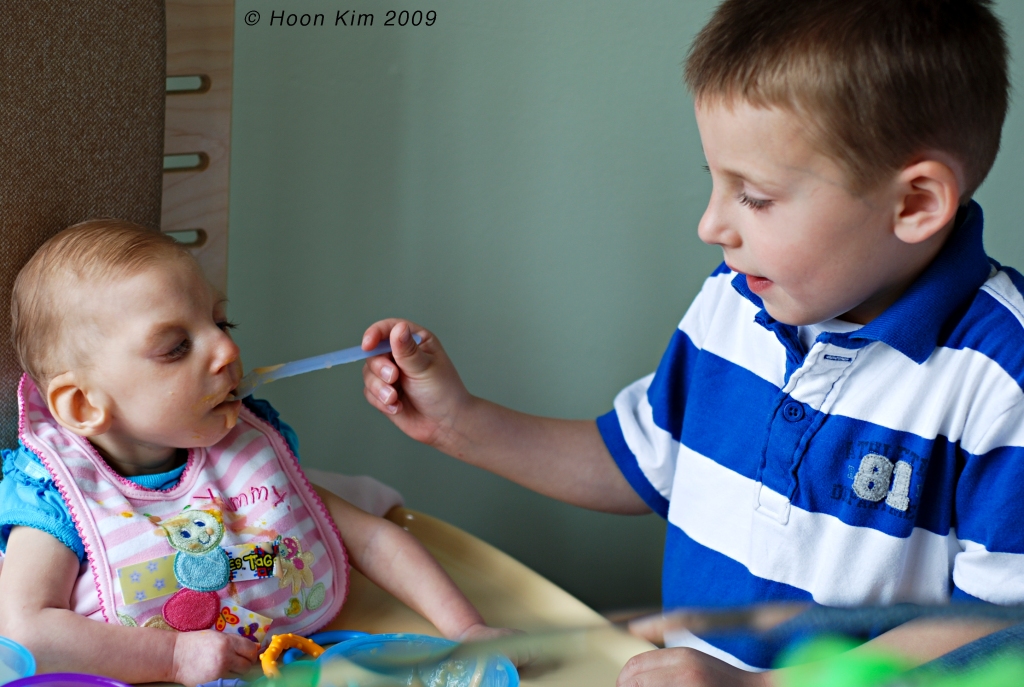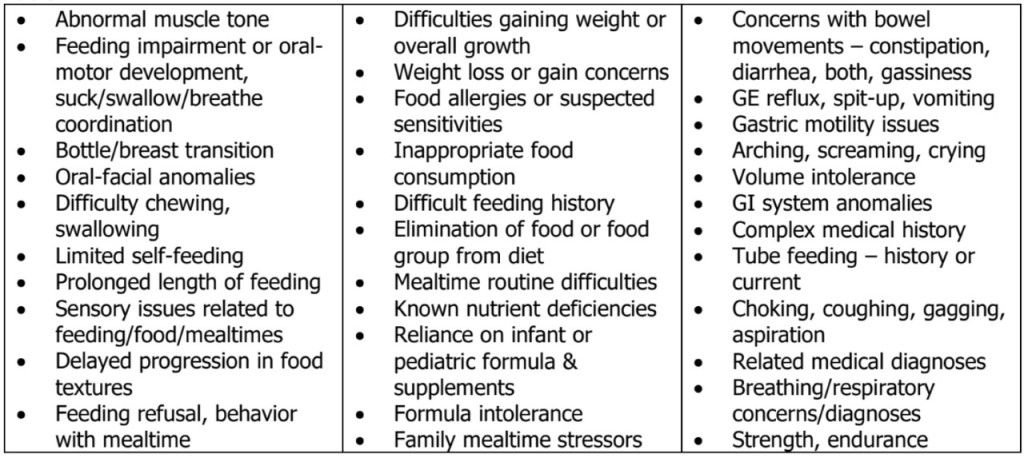By – Cindy Baranoski, MS, RDN, LDN and Laura Van Zandt OTR/L
-Updated February 2023-
In January 2019, a groundbreaking article was published in the Journal of Pediatric Gastroenterology and Nutrition describing children challenged with feeding problems and their care. Pediatric Feeding Disorders (PFD) is the term the expert team of authors define as “impaired oral intake that is not age-appropriate, and is associated with medical, nutrition, feeding skill, and/or psycho-social dysfunction.” It establishes the basis for creating and implementing a medical diagnosis code that would support children identified as having problems in any of these four areas, which are impaired by or impairing a child’s ability to eat a diet that is expected for age.
It concludes with the primary need for children to be identified early and receive interdisciplinary evaluations and interventions instead of seeing one practitioner alone to try and help all areas. Interdisciplinary thinking, evaluations, and treatment have been the core practice of Easterseals DuPage & Fox Valley’s Feeding Clinic for the past 21 years, since its inception in 2000.
What Brings You Here

From the moment we are born, feeding and eating is something that is supposed to come naturally to everyone. When a baby is born, we feel an overwhelming sense of love and a strong desire to watch over, protect, and nourish to grow. When it’s time for feeding, our bodies are already preparing the necessary tools to breakdown and process what is provided. Feeding involves more than just our mouths. At play are the sights (color, shape, size), feelings (warm, hot, cold, crunchy, chewy, soft, sticky), smells (sweet, stinky), sounds (loud, quiet), and most significantly, the way our body works. From how our muscles work together to align our trunk in sitting, allowing our arms to reach, grasp, and explore, to coordination of suck, swallow, and breathe, and manipulating the food in our mouths, everything sets the foundation for a good relationship with mealtimes and foods. Our past and current experiences all shape our belief around feeding and nutrition. Your body must work all together to receive and process nourishment.
For some children, however, this process isn’t easy and doesn’t always come naturally. Many children struggle to coordinate their bodies to eat or drink and have GI systems that do not process foods well, leading to constipation, diarrhea, vomiting, and gastroesophageal reflux, which then leads to poor growth, frustrations, fear, and worry. For children with respiratory conditions, poor coordination of breathing, overall weakness, eating a meal like other children their age is nearly impossible. Yet, they still need what other children need – nourishment, socialization, variety, scheduled mealtimes, and interaction with foods. For children, who may be fed through a tube, eating may not be the primary mode of nourishment, but all the other factors promote development, health, and good growth.
As a parent, there is nothing more important than watching your child grow and thrive, and nothing is more heart-wrenching than watching them struggle. When a child does not eat, parents feel blame and guilt. We ask ourselves why? Did I do this? What could I have done differently? We try a host of different strategies. We Google and seek advice from family, friends, and medical providers. We fall back to what we know, which may or may not work.
Who We Are
Our Feeding Clinic at Easterseals DuPage & Fox Valley consists of a team of individuals who have a passion for helping kids with feeding, mealtimes, tolerance, health, and growth. Our team assesses the many different reasons why a child might be struggling. We are not just looking at their ‘behavior’ but dig deeper and aim to understand the core source of the behavior and what it is communicating. Eating is so much more than bringing food to the mouth, chewing, and swallowing.
Our Clinic consists of a registered dietitian nutritionist, speech and language pathologist, occupational therapist, and a social worker. The team has over 230+ years of combined expertise and has gone on for extensive training in many areas, such as NeuroDevelopmental Therapy (NDT), Sequential Oral Sensory (SOS) Approach, DIR/Floortime, Respiratory and Rib Cage Development, Homeopathy, and Chinese medicine.
As a team, we review your child’s birth and developmental history before the appointment, with a thorough analysis of the diet record you submit. We ask you to let us know your evaluation expectations when filling out the paperwork, both online and written forms. Our goal is to meet these expectations. During the actual meeting we are looking and listening for red flags that clue us into issues driving the challenges your child is having. A list of possible reasons why your child might be seen by our feeding clinic is found in Table 1.
Table 1

What Happens, What We Do, and What’s Next
At Easterseals DuPage & Fox Valley, we are able to evaluate a child at our Villa Park center or through tele-therapy. Keeping our clients, their families, and our staff safe is a number one priority while continuing to be one of the most impactful Feeding Clinics around. Our clinic has been providing virtual evaluations since April 2020, and our use of HIPPA compliant Microsoft Teams platform has allowed everyone to participate fully. When your child is referred for an evaluation by the team, our Clinical Admissions Coordinator will guide you through our secure system of the intake process. We have revamped the process to make it easier for you and provide written suggestions to help you prepare for the evaluation day. If you are receiving a virtual consultation, we offer tips on setting up your space to allow a more successful evaluation of your child with the least amount of stress for you.
During the interdisciplinary evaluation, the full team meets with your family. Engaging with and helping your child feel comfortable, the speech and language pathologist and occupational therapist will give suggestions while listening and performing their physical assessment. We have worked hard to create a safe, calm, effortless process to continue to successfully support our Feeding Clinic evaluations, which continue to be very much in demand. Parent’s positive comments and impactful outcomes of our evaluations speak for themselves.
Medical & Nutrition

First the team reviews and establishes your child’s medical health and overall nutrition status. Many medical complications from birth can impact a child. Undiagnosed medical and gastrointestinal (GI) problems often come to light in the clinic.
Think of your child’s health as the foundation of your house. If your foundation is weak, then the floors above it will compensate for weakness. If your child struggles from constipation, diarrhea, dysmotility, gagging, GE reflux, they are most likely subconsciously learning to connect food and drink to feeling poorly. Additionally, understanding your child’s nutrition helps the team understand what might be contributing to what is not medical, allowing the team to make appropriate recommendations to ensure optimal growth and health. Analysis of current nutrition includes what is expected for your child, balance, the timing of meals/snacks, calories, protein, fluid, hydration, vitamins/minerals, route of nutrition, and growth. Understanding both medical health and nutrition status allows for changes from the foundation first and foremost.
Speech and Language Pathology & Occupational Therapy

Observing how your child interacts and engages during the evaluation can help the speech and language pathologist and occupational therapist before they move on to assess the physical portion of eating and drinking. No matter where your child is in their journey with food and feeding, our goal is to have a positive relationship during the process. While observing your child, both therapists also look at their underlying motor skills and evaluate if any postural supports might be beneficial. Mary Massery, a well-known physical therapist, has said “breathing always wins”, and she is not wrong. Breathing dominates. Where your body is in space and stability is its second priority. Swallowing and feeding behavior must continually adapt to changing respiratory and postural systems.
The speech and language pathologist works to get a better sense of your child’s oral motor skills while the occupational therapist observes potential underlying sensory processing difficulties and relationship issues with food. Anxiety around meals and feeding can increase adrenaline which suppresses our desire to eat. Assisting with overall regulation is essential for comfort at mealtimes.
Family Support
The emotion with feeding and nutrition difficulties can be overwhelming for both the parents and child. Often, a child’s survival from birth and medical health is the primary focus, as it should be. When a child becomes more stable, a parent can start to see beyond the medical fears and begin to focus on other things such as the experience of feeding. With this new focus, the emotions, fear, concerns, and hope are still there. Whether your child is struggling to be an oral eater or being fed by tube, the emotions can be immobilizing. Our social worker is a vital team member in our clinic, helping every parent know they are not alone. She provides support, empathy, and connections to any number of resources.
Wrapping Up
By the end of the evaluation, the team confers together, with immediate and long-term recommendations being made. Often, these recommendations focus on gut health, breathing, positioning, or establishing improved nutrition, before working on some of the more therapeutic needs such as oral motor skills or sensory processing/relationship interactions. Sometimes recommendations are made to work on several key things simultaneously to help your child be more clinically stable, or a single recommendation that may be central to all other concerns identified. Returning to our 90-minute clinic for a follow-up visit may be one of the recommendations made.
Final Thoughts
Wherever you are at in your child’s journey, there are many aspects to feeding disorders in the pediatric population. Therefore, identifying and addressing all of them is a priority that should not be overlooked. Easterseals DuPage & Fox Valley’s Feeding Clinic has been and continues to view your child and his care from this interdisciplinary “Pediatric Feeding Disorders” approach, involving a skilled and expert team of professionals. Nutrition issues is an area that brings an enormous amount of stress and anxiety to a child and his caregivers. Our team is uniquely qualified and experienced to assist children at all levels of feeding, instilling hope and helping them be their very best.
Every child is unique, and each intervention is tailored to fit your child and family. While you research options you have, consider the following –
- Aim to help your child feel their best. They need to feel well – this is key for success in any area.
- Assess their positioning with mealtimes and feeding to be sure they are fully supported. Positioning is key. Seated on a firm surface with feet flat on the floor or chair rail, with head and shoulders aligned over hips, equal weight bearing, is the most optimal positioning. Allow her arms to rest on her tray or table with shoulders down.
- Ensure a regular schedule. Regardless of if your child is orally fed or through a tube, a mealtime plan is essential, and helps your child learn hunger and fullness, allows their bodies to sustain through the day, can improve their overall tolerance, and should have a positive beginning and end.
- Patience – feeding therapy is a journey with bumps and curves along the road. Share your compassion and empathy. Learning to eat and mealtimes, after a rough beginning, might involve reshaping many memories. You might have to start over to build trust. Remember even the tortoise finished the race with the hare.
- Expose, expose, expose and don’t limit opportunities for exposure. Have fun and play with food. Model appropriate food reactions – don’t “yuck someone else’s yum.” Continue to find ways to present food to your child even if he is not ready to taste them. You can read books together about food, visit different grocery stores and markets, kids cooking classes, and find ways to get them involved in mealtime preparation without eating. And we encourage this, if a child is tube fed too.
To learn more on our Feeding Clinic and Nutrition Department at Easterseals DuPage & Fox Valley visit our website at: https://www.easterseals.com/dfv/our-programs/medical-rehabilitation/specialized-clinics/feeding-clinic.html. Contact Clinical Admissions at 630.261.6287 for questions or to schedule an appointment.


